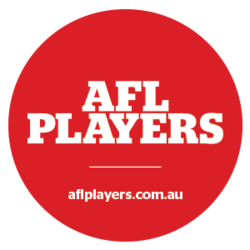AFL Players' Association
 |
|
| Full name | AFL Players Association |
|---|---|
| Founded | 1974 |
| Key people |
Matthew Pavlich, President Paul Marsh, CEO |
| Office location | Melbourne, Victoria. |
| Country | Australia |
| Website | AFLPlayers.com.au |
The AFL Players Association (AFLPA, also referred to as simply AFL Players) is the representative body for all current and past professional Australian Football League players.
The AFLPA promotes and protects its members through initiatives including workplace relations and advocacy, career development and various community events.
Players welfare is the primary function of AFLPA, and it aims to ensure the sustainability and integrity of the game by investing in the personal development of past, present and future AFL footballers.
Established in its current from in 1974, the AFL Players Association provides a means for the AFL and Clubs to consult with players, and as a lobbying group for players, in the making and implementation of rules and other issues affecting AFL players.
The current CEO of the AFLPA is Paul Marsh.
The formation of a representative body for Victorian Football League (VFL) players was first attempted in 1955. The VFL successfully opposed the registration of this body and the fledgling union was disbanded.
The AFLPA in its current form was established in 1974 at the behest of players Geoff Pryor (Essendon), Gareth Andrews (Geelong), Des Meagher (Hawthorn) and David McKay (Carlton). In 1979, the association appointed three key positions to lead the organisation:
At this point, the only source of funding was the annual $35 membership fee.
In late 1980, the VFL withdrew recognition of the AFLPA, effectively leaving the players without a negotiating body.
In 1981, a pre-season match between Essendon and Fitzroy was threatened with strike action by the association over the VFL’s non-recognition of the body. The VFL halted the proposed strike by agreeing to recognise the association as the negotiating body for all players.
In 1984, Bryan Roberts resigned. Len Coysh left one year later. Peter Allen remained to run the association and stayed committed to the cause for two decades before resigning to head the AFL Coaches Association until his death in June 2007.
...
Wikipedia
